High-Purity L-Aspartic Acid Dibenzyl Ester Hydrochloride for Advanced Peptide Synthesis and Research
Your essential building block for cutting-edge peptide synthesis and novel molecular applications.
Get a Quote & SampleProduct Core Value

L-Aspartic Acid Dibenzyl Ester Hydrochloride
A critical protected amino acid derivative, essential for complex peptide synthesis, peptidomimetic design, and bioconjugation strategies. Its dibenzyl ester protection of carboxyl groups offers stability during synthesis while allowing for selective deprotection, making it a versatile tool in modern chemical biology and drug discovery.
- Dibenzyl ester protection provides robust protection for carboxyl groups, essential for controlled peptide bond formation.
- This compound is key to implementing orthogonal protection strategies in both solution-phase and solid-phase peptide synthesis.
- Its benzyl ester groups can be selectively removed via catalytic hydrogenation or strong acid cleavage, facilitating downstream modifications.
- Facilitates the creation of peptidomimetics and constrained peptide analogues, crucial for enhanced bioactivity and metabolic stability.
Key Advantages
Versatile Protection Strategy
The benzyl ester protection for L-Aspartic acid dibenzyl ester hydrochloride offers a balance of stability and cleavability, crucial for complex peptide synthesis protocols.
Enabling Complex Synthesis
Critical for constructing intricate peptide sequences and designing peptidomimetics by offering a reliable protected amino acid building block.
Facilitates Bioconjugation
The deprotected carboxyl group serves as a vital handle for attaching drugs, probes, or nanomaterials, expanding its utility in bioconjugation strategies.
Key Applications
Peptide Synthesis
Used as a fundamental building block in both solution-phase and solid-phase techniques, enabling the precise assembly of peptide chains.
Peptidomimetic Design
Incorporated into structures to create molecules that mimic peptides but possess improved stability and bioavailability, vital for drug discovery.
Bioconjugation Chemistry
The deprotected carboxyl side chain is used to link peptides to other molecules like drugs, imaging agents, or surfaces for targeted delivery and diagnostics.
NRPS Analogue Synthesis
Serves as a precursor in the synthesis of non-ribosomal peptide analogues, expanding the scope of synthetic biology and natural product chemistry.
